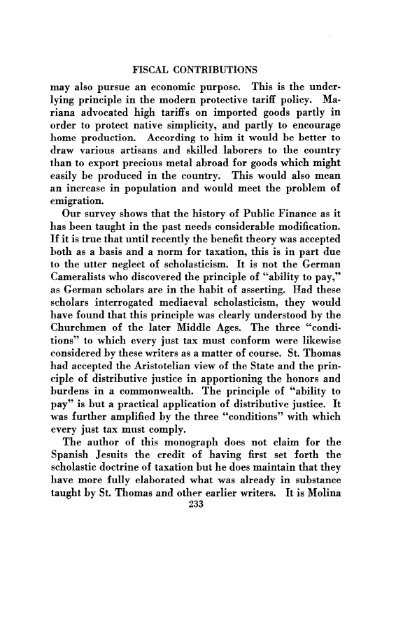The Political Economy of Juan de Mariana - Ludwig von Mises Institute
The Political Economy of Juan de Mariana - Ludwig von Mises Institute
The Political Economy of Juan de Mariana - Ludwig von Mises Institute
You also want an ePaper? Increase the reach of your titles
YUMPU automatically turns print PDFs into web optimized ePapers that Google loves.
FISCAL CONTRIBUTIONS<br />
may also pursue an economic purpose. This is the un<strong>de</strong>rlying<br />
principle in the mo<strong>de</strong>rn protective tariff policy. <strong>Mariana</strong><br />
advocated high tariffs on imported goods partly in<br />
or<strong>de</strong>r to protect native simplicity, and partly to encourage<br />
home production. According to him it would he better to<br />
draw various artisans and skilled laborers to the country<br />
than to export precious metal abroad for goods which might<br />
easily he produced in the country. This would also mean<br />
an increase in population and would meet the problem <strong>of</strong><br />
emigration.<br />
Our survey shows that the history <strong>of</strong> Public Finance as it<br />
has been taught in the past needs consi<strong>de</strong>rable modification.<br />
If it is true that until recently the benefit theory was accepted<br />
both as a basis and a norm for taxation, this is in part due<br />
to the utter neglect <strong>of</strong> scholasticism. It is not the German<br />
Cameralists who discovered the principle <strong>of</strong> "ability to pay,"<br />
as German scholars are in the habit <strong>of</strong> asserting. Had these<br />
scholars interrogated mediaeval scholasticism, they would<br />
have found that this principle was clearly un<strong>de</strong>rstood by the<br />
Churchmen <strong>of</strong> the later Middle Ages. <strong>The</strong> three "conditions"<br />
to which every just tax must conform were likewise<br />
consi<strong>de</strong>red by these writers as a matter <strong>of</strong> course. St. Thomas<br />
had accepted the Aristotelian view <strong>of</strong> the State and the principle<br />
<strong>of</strong> distributive justice in apportioning the honors and<br />
bur<strong>de</strong>ns in a commonwealth. <strong>The</strong> principle <strong>of</strong> "ability to<br />
pay" is but a practical application <strong>of</strong> distributive justice. It<br />
was further amplified by the three "conditions" with which<br />
every just tax must comply.<br />
<strong>The</strong> author <strong>of</strong> this monograph does not claim for the<br />
Spanish Jesuits the credit <strong>of</strong> having first set: forth the<br />
scholastic doctrine <strong>of</strong> taxation but he does maintain that they<br />
have more fully elaborated what was already in substance<br />
taught by St. Thomas and other earlier writers. It is Molina<br />
. 233

















